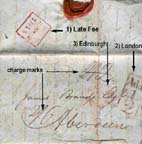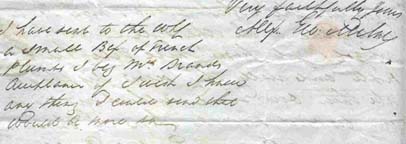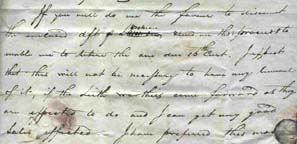[Eunice and Ron Shanahan have shared with readers of the Victorian Web this material from their website, Letters from the Past. Click on thumbnails for larger images.]
This letter is a business communication, written by Alex. Geo. Milne in London to James Brand Esquire, Aberdeen, Scotland. I have not been able to discover what kind of business it was, but it was obviously quite large-scale if the sums of money mentioned are anything to go by.

The letter's postal markings
The postal markings are very interesting, and the illustration shows :-
- a clear, boxed ‘LATE FEE’ date stamp in red. The 'Late Fee' system was in use from 1790 at the Chief Office of the General Post in London. It cost 6d (six pence) and had to be paid when the letter was lodged and only between 7pm and 7.45pm to ensure despatch of the letter in that night's mails. The mail counter closed at 7 pm, but the mails were actually despatched at 8 pm. There were three different postmarks while the system was in effect. First a square frame, then a circular frame and then a square frame again. This square one was used from 1813 until the early 1850s. As they were pre-paid, they were usually applied in red ink. This example showing the date as 2 MA 2 1815 left London that night, and travelled to Aberdeen via Edinburgh.
- The Scottish Additional Halfpenny tax — stamp applied in London, of the type in use from 1813-1817. This was one of three types used in London, the other two being a framed ½, and an unframed ½ — without the wording ‘Addl’.
- The transit datestamp applied in red in Edinburgh — this is octagonal with MAR at the top 1815 at the bottom and the day 5 in the centre. The initial M on the right signifies it was a morning duty stamp and the W at the left is the identifying letter for the stamp.There is no arrival stamp for Aberdeen.
As a matter of interest, the figures written on the front '2/2' which has a line drawn through it, and substituted with '2/6' are the postage charges. The 2/2 is incorrect, as it is the rate for London to Edinburgh. This journey of 3 days was the standard time taken to cover the distance of 396 Miles from London to Edinburgh. But the letter was going beyond Edinburgh, to Aberdeen, which was 528 miles from London — and that was 1/3 for a single letter. However the letter had an enclosure, so it cost double the amount i.e. 2 shillings and 6d, plus the Additional ½d, which in this case, would have been paid by the addressee.
The letters
And now to the contents of the letter:
London 2nd March 1815
My Dear Sir,
Your regarded favor of 13th ult to Alex came duly to hand and he has written you since to which I would beg to refer. The Bill for £4200 has been retired, but we must still beg your kind indulgence and assistance regarding the other about which Sandy will write on the other side — We have not got 1d (one penny) yet from these vile Leith People and really they seem disposed to take their own time without regard to our conduct towards them.
In business there is still a wonderful Dullness and even an impossibility of forcing sales, but cannot now long continue as the weather is now such as to open our communications with the Continent.
There is nothing I am so anxious for as to endeavour to realise and get matters once again into a comfortable train which I would fain hope cannot now require very long time.
I beg to be particularly remembered to Mrs & Miss Brand and always am with much regard
My Dear Sir
Very faithfully yours
Alex. Geo Milne

Then he has added this sentence:
I have sent to the whf (wharf) a small box of French Plumbs I beg Mrs Brand's acceptance of — I wish I knew any thing I could send would be more sa. (satisfactory?)
I checked the use of the word ‘retire’ in this letter, and the Oxford English Dictionary has this definition :- ‘retire (Finance), withdraw (bill, note) from operation or currency.’
On the inside of the letter in different writing (presumably by the 'Sandy' mentioned in the first paragraph), but it is not signed.

you have a note of Douglas Brown & Coy Glasgow which have the goodness to discount out & send me the proceeds.
If you will do me the favour to discount the inclosed draft (*) for £8004 & send me the proceeds to enable me to retire the one due 16th curt. (Current). I expect that this will not be necessary to have any renewal of it, if the Leith worthies come forward as they are expected to do and I can get any good Sales effected — I have preferred this mode in preference as it will keep matters distinct and the other Bills you hold are not for any transaction in Business, but for your Security. If however there is any other arrangement you would prefer be so good as let me know and I shall do what you wish.
(*) This is the reason for the double postage rate.
When this letter was written Napoleon had just landed on the Coast of France having escaped from his imprisonment on the Island of Elba. For the next 100 days he raised an army in France & fought against the Allied Armies led by Wellington and Blucher, culminating in his defeat in June 1815 at Waterloo. So Mr Milne’s hopes that business would improve now that communications with the Continent would be open after the winter, may well have proved false.
Related Material
- The letter's postal markings
- Detail of closing section
- Another detailed view (of the section beginning “If you will do me the favour.”)
Last modified 25 May 2010